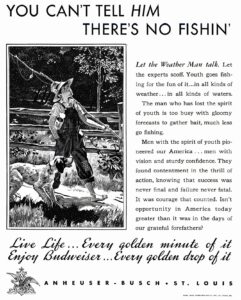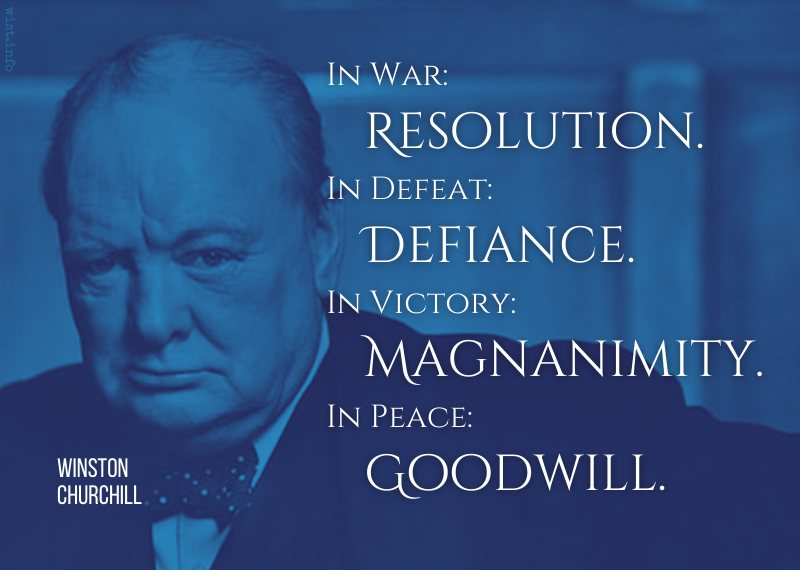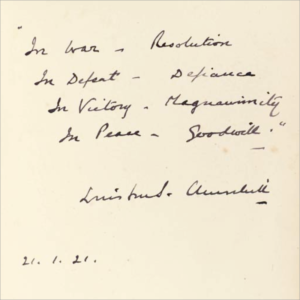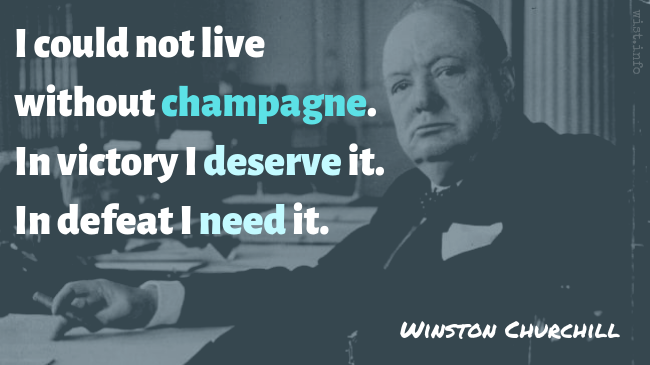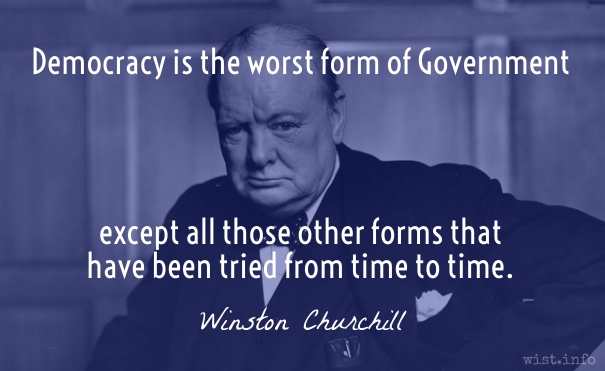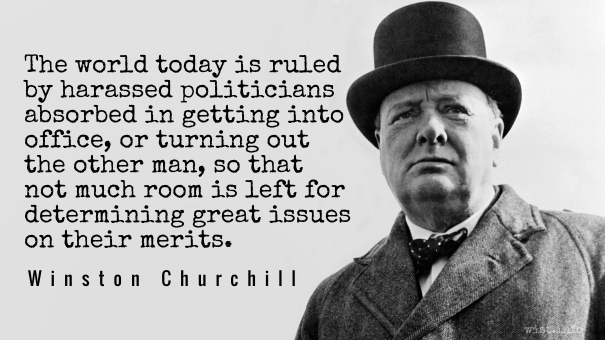We shall go on to the end, we shall fight in France, we shall fight on the seas and oceans, we shall fight with growing confidence and growing strength in the air, we shall defend our Island, whatever the cost may be, we shall fight on the beaches, we shall fight on the landing grounds, we shall fight in the fields and in the streets, we shall fight in the hills; we shall never surrender, and even if, which I do not for a moment believe, this Island or a large part of it were subjugated and starving, then our Empire beyond the seas, armed and guarded by the British Fleet, would carry on the struggle, until, in God’s good time, the New World, with all its power and might, steps forth to the rescue and the liberation of the Old.
Winston Churchill (1874-1965) British statesman and author
Speech in the House of Commons (4 Jun 1940)
Full text.
Quotations by:
Churchill, Winston
Every day you may make progress. Every step may be fruitful. Yet there will stretch out before you an ever-lengthening, ever-ascending, ever-improving path. You know you will never get to the end of the journey. But this, so far from discouraging, only adds to the joy and the glory of the climb.
People say we ought not to allow ourselves to be drawn into a theoretical antagonism between Nazidom and democracy; but the antagonism is here now. It is this very conflict of spiritual and moral ideas which gives the free countries a great part of their strength. You see these dictators on their pedestals, surrounded by the bayonets of their soldiers and the truncheons of their police. On all sides they are guarded by masses of armed men, cannons, aeroplanes, fortifications, and the like — they boast and vaunt themselves before the world, yet in their hearts there is unspoken fear. They are afraid of words and thoughts; words spoken abroad, thoughts stirring at home — all the more powerful because forbidden — terrify them. A little mouse of thought appears in the room, and even the mightiest potentates are thrown into panic. They make frantic efforts to bar our thoughts and words; they are afraid of the workings of the human mind. Cannons, airplanes, they can manufacture in large quantities; but how are they to quell the natural promptings of human nature, which after all these centuries of trial and progress has inherited a whole armoury of potent and indestructible knowledge?
Winston Churchill (1874-1965) British statesman and author
“The Defence of Freedom and Peace (The Lights are Going Out),” radio broadcast (16 Oct 1938)
(Source)
The influence exercised over the human mind by apt analogies is and has always been immense. Whether they translate an established truth into simple language or whether they adventurously aspire to reveal the unknown, they are among the most formidable weapons of the rhetorician.
Winston Churchill (1874-1965) British statesman and author
“The Scaffolding of Rhetoric” (Nov 1897)
(Source)
Commonly abridged, "Apt analogies are among the most formidable weapons of the rhetorician."
We must never cease to proclaim in fearless tones the great principles of freedom and the rights of man which are the joint inheritance of the English-speaking world and which through Magna Carta, the Bill of Rights, the Habeas Corpus, trial by jury, and the English common law find their most famous expression in the American Declaration of Independence.
I am prepared to meet my Maker. Whether my Maker is prepared for the great ordeal of meeting me is another matter.
WOMAN: There are two things I don’t like about you, Mr. Churchill — your politics and your mustache.
CHURCHILL: My dear madam, pray do not disturb yourself. You are not likely to come into contact with either.
An appeaser is one who feeds a crocodile, hoping it will eat him last.
Winston Churchill (1874-1965) British statesman and author
(Attributed)
Churchill reportedly used used this phrase frequently prior to WWII, but it has not been found per se by Churchill scholars in his writings, speeches, press conferences, radio addresses, or parliamentary debates.
However, on a radio broadcast (20 Jan 1940), speaking of the neutral states standing by while Germany (and Russia) swallowed them up (referencing Finland fighting against Russia in particular), "Each one hopes that if he feeds the crocodile enough, the crocodile will eat him last. All of them hope that the storm will pass before their turn comes to be devoured. But I fear -- I fear greatly -- the storm will not pass. It will rage and it will roar, even more loudly, even more widely."
Also attributed to Franklin Roosevelt.
More discussion of this quotation: An Appeaser Is One Who Feeds a Crocodile, Hoping It Will Eat Him Last – Quote Investigator.
He has all the virtues I dislike and none of the vices I admire.
The biggest argument against democracy is a five minute discussion with the average voter.
One ought never to turn one’s back on a threatened danger and try to run away from it. If you do that, you will double your danger. But if you meet it promptly and without flinching, you will reduce the danger by half. Never run away from anything. Never!
Before we proceed further let us get one thing clear. Are we talking about the Indians in India who have multiplied alarmingly under benevolent British rule, or are we talking about the Indians in America who, I understand, are now almost extinct?
If you’re going through hell, keep going.
Winston Churchill (1874-1965) British statesman and author
(Spurious)
Also sometimes given as "If you're going through hell, don't stop." Not found in any of Churchill's written works or directly attributed to him in any reliable source. See here for more information.
This is the sort of pedantry up with which I will not put.
Winston Churchill (1874-1965) British statesman and author
(Spurious)
Margin note after receiving an objection to ending a sentence with a preposition and using a dangling participle in official documents. Frequently attributed to Churchill, the earliest reference to himwith this quotation is in September 1945. The earliest the comment can be found is in a joke (not mentioning Churchill) in The Strand in May 1942. More here.Also given in different sources as:
- "This is the sort of bloody nonsense up with which I will not put."
- "This is the kind of arrant pedantry up with which I will not put."
- "This is the type of impertinence up with which I shall not put."
If you’re not a liberal when you’re 25, you have no heart. If you’re not a conservative by the time you’re 35, you have no brain.
Winston Churchill (1874-1965) British statesman and author
(Spurious)
This hasn't been found in Churchill's writings, and is generally believed by researchers (and the Churchill Centre) to be spurious. It's also misaligned with the ideological cycle of Churchill's own career.
See Clemenceau for more discussion about this general quotation form.
Don’t talk to me about naval tradition. It’s nothing but rum, sodomy, and the lash.
Courage is what it takes to stand up and speak; courage is also what it takes to sit down and listen.
Winston Churchill (1874-1965) British statesman and author
(Spurious)
(Source)
Not found in Churchill's works.
Success is not final, failure is not fatal: it is the courage to continue that counts.
Winston Churchill (1874-1965) British statesman and author
(Spurious)
(Source)
Variant: "Success is never final and failure never fatal. It’s courage that counts."
Not found in Churchill's canon. There are precursors to elements of this quotation, but the earliest version substantially like it is found in a 1938 Budweiser beer print advertisement:
Men with the spirit of youth pioneered our America ... men with vision and sturdy confidence. They found contentment in the thrill of action, knowing that success was never final and failure never fatal. It was courage that counted. Isn’t opportunity in America today greater than it was in the days of our grateful forefathers?
More discussion about this quotation:
Also attributed to Abraham Lincoln and John Wooden. Preacher Robert Schuller used Success is Never Ending, Failure is Never Final as the title of a 1990 book.
Success is going from failure to failure without losing your enthusiasm.
Winston Churchill (1874-1965) British statesman and author
(Spurious)
Widely attributed to Churchill, but not found in his writings or contemporary reports of his speech. It's also attributed to Abraham Lincoln, with similar lack of provenance.
Variants:More information about this quotation:
- "Success is the ability to move from one failure to another without loss of enthusiasm."
- "Courage is going from failure to failure without losing enthusiasm."
- "To succeed is to fail repeatedly, but without losing enthusiasm."
A modern dictator with the resources of science at his disposal can easily lead the public on from day to day, destroying all persistency of thought and aim, so that memory is blurred by the multiplicity of daily news and judgment baffled by its perversion.
No one can understand history without continually relating the long periods which are constantly mentioned to the experiences of our own short lives. Five years is a lot. Twenty years is the horizon to most people. Fifty years is antiquity. To understand how the impact of destiny fell upon any generation of men one must first imagine their position and then apply the time-scale of our own lives.
Never, never, never believe any war will be smooth and easy, or that anyone who embarks on the strange voyage can measure the tides and hurricanes he will encounter. The statesman who yields to war fever must realise that once the signal is given, he is no longer the master of policy but the slave of unforeseeable and uncontrollable events. Antiquated War Offices, weak, incompetent, or arrogant Commanders, untrustworthy allies, hostile neutrals, malignant Fortune, ugly surprises, awful miscalculations — all take their seats at the Council Board on the morrow of a declaration of war. Always remember, however sure you are that you could easily win, that there would not be a war if the other man did not think he also had a chance.
I wonder whether any other generation has seen such astounding revolutions of data and values as those through which we have lived. Scarcely anything material or established which I was brought up to believe was permanent and vital, has lasted. Everything I was sure or taught to be sure was impossible, has happened.
It is a good thing for an uneducated man to read books of quotations. Bartlett’s Familiar Quotations is an admirable work, and I studied it intently. The quotations when engraved upon the memory give you good thoughts. They also make you anxious to read the authors and look for more.
It is the habit of the boa constrictor to besmear the body of his victim with a foul slime before he devours it; and there are many people in England, and perhaps elsewhere, who seem to be unable to contemplate military operations for clear political objects, unless they can cajole themselves into the belief that their enemy are utterly and hopelessly vile. To this end the Dervishes, from the Mahdi and the Khalifa downwards, have been loaded with every variety of abuse and charged with all conceivable crimes. This may be very comforting to philanthropic persons at home; but when an army in the field becomes imbued with the idea that the enemy are vermin who cumber the earth, instances of barbarity may easily be the outcome. This unmeasured condemnation is moreover as unjust as it is dangerous and unnecessary.
Winston Churchill (1874-1965) British statesman and author
The River War: An Historical Account of the Reconquest of the Soudan, Vol. II (1899)
This passage is not included in the 1902 one-volume abridgment.
Still, if you will not fight for the right when you can easily win without bloodshed; if you will not fight when your victory will be sure and not too costly; you may come to the moment when you will have to fight with all the odds against you and only a precarious chance of survival. There may even be a worse case. You may have to fight when there is no hope of victory, because it is better to perish than to live as slaves.
In War: Resolution.
In Defeat: Defiance.
In Victory: Magnanimity.
In Peace: Goodwill.Winston Churchill (1874-1965) British statesman and author
The Second World War, Vol. 1: The Gathering Storm, Epigram, “Moral of the Work,” (1948)
(Source)
The most famous use of the quote, though it can be found as far back as 21 Jan 1921 in Churchill's own hand, and Edward Marsh, his private secretary, suggested it dated back to just after WW I, as a possible war memorial.
More information here: CHURCHILL, Sir Winston Spencer (1874-1965). Autograph sentiment signed and dated, 21 January 1921, 'In War - Resolution , In Defeat - Defiance , In Victory - Magnanimity , In Peace - Goodwill', one page, 4°, in a commonplace book further inscribed and signed 'To Nell from Winston S. Churchill 21.1.21', and with one other inscription, contemporary marbled calf, front cover panelled in gilt and blind. Provenance: Roy A. Dalton; and by descent..
When I look back on all these worries I remember the story of the old man who said on his deathbed that he had had a lot of trouble in his life, most of which had never happened.
Winston Churchill (1874-1965) British statesman and author
The Second World War, Vol. 2: Their Finest Hour, ch. 23 “September Tensions” (1949)
(Source)
War is mainly a catalogue of blunders.
Winston Churchill (1874-1965) British statesman and author
The Second World War, Vol. 3: The Grand Alliance, ch. 20 “The Soviet Nemesis” (1950)
(Source)
Specifically, on the USSR failing to form an allied front in the Balkans against Hitler prior to his attack on them.
I am reminded of the professor who, in his declining hours, was asked by his devoted pupils for his final counsel. He replied, “Verify your quotations.”
Winston Churchill (1874-1965) British statesman and author
The Second World War, Vol. 4: The Hinge of Fate (1951)
(Source)
‘In war-time,’ I said, ‘truth is so precious she should always be attended by a bodyguard of lies.’
Some people did not like this ceremonious style. But after all when you have to kill a man it costs nothing to be polite.
Winston Churchill (1874-1965) British statesman and author
The Second World War, Volume 3: The Grand Alliance, ch. 32 “Pearl Harbor” (1950)
On his closing his 8 Dec 1941 letter to the Japanese ambassador, informing him of the state of war between the UK and Japan, with "I have the honour to be, with high consideration, Sir, Your obedient servant."
By noon it was clear that the Socialists would have a majority. At luncheon my wife said to me, ‘It may well be a blessing in disguise.’ I replied, ‘At the moment it seems quite effectively disguised.’
If you will not fight for the right when you can easily win without bloodshed; if you will not fight when your victory will be sure and not too costly; you may come to the moment when you will have to fight with all the odds against you and only a small chance of survival. There may even be a worse case: you may have to fight when there is no hope of victory, because it is better to perish than to live as slaves.
Broadly speaking, short words are best, and the old words, when short, are the best of all.
Winston Churchill (1874-1965) British statesman and author
The Times Literary Award luncheon, London (2 Nov 1949)
(Source)
When great causes are on the move in the world, stirring all men’s souls, drawing them from their firesides, casting aside comfort, wealth, and the pursuit of happiness in response to impulses at once awe-striking and irresistible, we learn that we are spirits, not animals, and that something is going on in space and time, and beyond space and time, which, whether we like it or not, spells duty.
Winston Churchill (1874-1965) British statesman and author
BBC Radio broadcast (16 Jun 1941)
(Source)
First published in the Imperial Review (28 Jun 1941).
When the eagles are silent, the parrots begin to jabber.
Winston Churchill (1874-1965) British statesman and author
Comment (16 May 1945)
(Source)
Churchill used this phrase on multiple occasions over the years. This one, quoted by Field Marshal Alan Brooke, War Diaries (2001), was directed at the post-war complaints of Tito and DeGaulle.
BESSIE BRADDOCK: Winston, you are drunk, and what’s more you are disgustingly drunk.
WINSTON CHURCHILL: Bessie, my dear, you are ugly, and what’s more, you are disgustingly ugly. But tomorrow I shall be sober and you will still be disgustingly ugly.
Winston Churchill (1874-1965) British statesman and author
Comment (1946)
Version as cited Richard Langworth, Churchill by Himself: The Definitive Collection of Quotations. The story was supposedly vouched for by Churchill's bodyguard, but versions of this exchange can be found (with different players) back to 1882. More info here.
In the course of my life I have often had to eat my words, and I must confess that I have always found it a wholesome diet.
Winston Churchill (1874-1965) British statesman and author
Comment (c. 1940s)
(Source)
Quoted by Lord Normanbrook in John Wheeler-Bennett, ed., Action This Day: Working with Churchill, p. 28 (1968).
Frequently paraphrased as:
- "Eating my words has never given me indigestion."
- "I have never developed indigestion from eating my words."
I could not live without Champagne. In victory I deserve it. In defeat I need it.
Winston Churchill (1874-1965) British statesman and author
Comment to Odette Pol Roger (1946)
Frequently misattributed to Napoleon Bonaparte ("In victory you deserve champagne. In defeat you need it."); no citation of the quote has been fond prior to 1946. See here for more discussion.
Everyone is in favor of free speech. Hardly a day passes without its being extolled, but some people’s idea of it is that they are free to say what they like, but if anyone says anything back, that is an outrage.
Winston Churchill (1874-1965) British statesman and author
Debate, House of Commons (13 Oct 1943)
(Source)
More discussion of this quotation: If Anyone Says Anything Back, That Is an Outrage – Quote Investigator.
The only guide to a man is his conscience, the only shield to his memory is the rectitude and the sincerity of his actions. It is very imprudent to walk through life without this shield, because we are so often mocked by the failure of our hopes and the upsetting of our calculations; but with this shield, however the fates may play, we march always in the ranks of honour.
When I was young, for two or three years the light faded out of the picture. I did my work. I sat in the House of Commons, but black depression settled on me. It helped me to talk to Clemmie about it. I don’t like standing near the edge of a platform when an express train is passing through. I like to stand right back and if possible to get a pillar between me and the train. I don’t like to stand by the side of a ship and look down into the water. A second’s action would end everything. A few drops of desperation.
When I was young, for two or three years the light faded out of the picture. I did my work. I sat in the House of Commons, but black depression settled on me. It helped me to talk to Clemmie about it. I don’t like standing near the edge of a platform whn an express train is passing through. I like to stand right back and if possible to get a pillar between me and the train. I don’t like to stand by the side of a ship and look down into the water. A second’s action would end everything. A few drops of desperation.
Do you know why I hate the Nazis? I hate them because they frown when they fight. They are grim and sullen. Now, take our magnificent Air Force lads — they grin when they fight. I like a man who grins when he fights.
Winston Churchill (1874-1965) British statesman and author
Remark to Quentin Reynolds (1941)
Full text.
To jaw-jaw is always better than to war-war.
Winston Churchill (1874-1965) British statesman and author
Remarks, White House luncheon (25 Jun 1954)
On dealing with the Soviets. Quoted in NY Times (27 Jun 1954). Full text.
It is vain to imagine that the mere perception or declaration of right principles, whether in one country or in many countries, will be of any value unless they are supported by those qualities of civic virtue and manly courage
Now this is not the end. It is not even the beginning of the end. But it is, perhaps, the end of the beginning.
Never give in, never give in, never, never, never — in nothing, great or small, large or petty — never give in except to convictions of honour and good sense. Never yield to force; never yield to the apparently overwhelming might of the enemy.
Winston Churchill (1874-1965) British statesman and author
Speech, Harrow School, England (1941-10-29)
(Source)
Do not let us speak of darker days: let us speak rather of sterner days. These are not dark days; these are great days — the greatest days our country has ever lived; and we must all thank God that we have been allowed, each of us according to our stations, to play a part in making these days memorable in the history of our race.
Winston Churchill (1874-1965) British statesman and author
Speech, Harrow School, England (1941-10-29)
(Source)
The day may dawn when fair play, love for one’s fellow men, respect for justice and freedom, will enable tormented generations to march forth triumphant from the hideous epoch in which we have to dwell. Meanwhile, never flinch, never weary, never despair.
Many forms of Government have been tried, and will be tried in this world of sin and woe. No one pretends that democracy is perfect or all-wise. Indeed, it has been said that democracy is the worst form of Government except all those other forms that have been tried from time to time.
The era of procrastination, of half-measures, of soothing and baffling expedients, of delays, is coming to its close. In its place we are entering a period of consequences.
Winston Churchill (1874-1965) British statesman and author
Speech, House of Commons (12 Nov 1936)
Full text.
I would say to the House, as I said to those who have joined this Government: “I have nothing to offer but blood, toil, tears and sweat.” We have before us an ordeal of the most grievous kind. We have before us many, many long months of struggle and of suffering. You ask, what is our policy? I can say: It is to wage war, by sea, land and air, with all our might and with all the strength that God can give us; to wage war against a monstrous tyranny, never surpassed in the dark, lamentable catalogue of human crime. That is our policy. You ask, what is our aim? I can answer in one word: It is victory, victory at all costs, victory in spite of all terror, victory, however long and hard the road may be; for without victory, there is no survival.
Winston Churchill (1874-1965) British statesman and author
Speech, House of Commons (13 May 1940)
(Source)
Churchill's first speech in the House after becoming prime minister. Often paraphrased, "I have nothing to offer but blood, sweat and tears..." Audio records of the speech omit the "It is" in the beginning of the "Victory" section.
Want of foresight, unwillingness to act when action would be simple and effective, lack of clear thinking, confusion of counsel until the emergency comes, until self-preservation strikes its jarring gong — these are the features which constitute the endless repetition of history.
The inherent vice of capitalism is the unequal sharing of blessings. The inherent virtue of socialism is the equal sharing of miseries.
Winston Churchill (1874-1965) British statesman and author
Speech, House of Commons (22 Oct 1945)
(Source)
For my part, I consider that it will be found much better by all parties to leave the past to history, especially as I propose to write that history myself.
Winston Churchill (1874-1965) British statesman and author
Speech, House of Commons (23 Jan 1948)
(Source)
Sometimes given: "History will bear me out, particularly as I shall write that history myself." More discussion here: Churchillisms: "Leave the Past to History" (which He will Write).
We shape our buildings, and afterwards our buildings shape us.
Winston Churchill (1874-1965) British statesman and author
Speech, House of Commons (28 Oct 1943)
(Source)
During the debate over rebuilding the House of Commons, which had been destroyed during a German bombing.
The world looks with some awe upon a man who appears unconcernedly indifferent to home, money, comfort, rank, or even power and fame. The world feels not without a certain apprehension, that here is some one outside its jurisdiction; someone before whom its allurements may be spread in vain; some one strangely enfranchised, untamed, untrammelled by convention, moving independent of the ordinary currents of human action.
Without tradition, art is a flock of sheep without a shepherd. Without innovation, it is a corpse.
Winston Churchill (1874-1965) British statesman and author
Speech, Royal Academy of Art banquet, London (30 Apr 1953)
(Source)
As someone said, you will never get to the end of the journey if you stop to shy a stone at every dog that barks.
You might however consider whether you should not unfold as a background the great privilege of habeas corpus and trial by jury, which are the supreme protection invented by the English people for ordinary individuals against the state. The power of the Executive to cast a man in prison without formulating any charge known to the law, and particularly to deny him the judgment of his peers is in the highest degree odious and is the foundation of all totalitarian government, whether Nazi or Communist.


